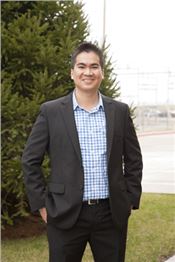New Rice Breeder Hired At SEMO

Joining the staff at SEMO in mid-October to develop varieties suitable for Missouri rice growing conditions
is Dr. Christian De Guzman, who received his Ph.D. in Agronomy with emphasis on Plant Breeding and
Genetics from LSU this past August.
Photo by John LaRose, Jr.
BETTY VALLE GEGG-NAEGER
MidAmerica Farmer Grower
CAPE GIRARDEAU, MO.
A new rice breeder was hired at Southeast Missouri State University (SEMO) recently. Dr. Christian De Guzman, who received his Ph.D. in Agronomy with emphasis on Plant Breeding and Genetics from LSU this past August, joined the staff at SEMO in mid-October to develop varieties suitable for Missouri rice growing conditions. He introduced himself at the Missouri Rice Research and Merchandising Council recently.
“As soon as I got here, I looked at what has been previously done and reviewed the very few germplasms that are currently available” he said. “Since then, I visited universities with successful breeding programs like Texas A&M, University of Arkansas, Mississippi State and Louisiana State University to get more germplasms to add to the existing ones so I can begin to develop a new variety suitable for the state.”
According to De Guzman, “Development normally takes some time, it doesn’t happen quickly.
“However, with the new technologies available, I expect it to go somewhat faster. On top of conventional breeding practices, I plan to include DNA marker technology,” he said.
“We will be working alongside partner institutions that have more capabilities and resources at this time. It might also be possible to outsource some of our requirements to other private companies until we get our program and facilities fully established,” De Guzman explained.
“The focus will be more on long grain rice, conventional and Clearfield,” he said. “That’s what our local farmers are planting. Hopefully we can get an agreement with BASF on Provisia rice soon. A portion of our resources will also be focused on medium grain rice and some development of male sterile lines for hybrids.”
De Guzman offered hope and urged patience to the producers who wish for lines more compatible with Missouri conditions.
“I am confident that we will get a variety. Using new technologies will allow us to be more efficient and reduce time. It’s not to say that it is going to be easy since some important tools are not available in our lab, but we are making progress on that end. I hope our farmers will bear with me as I am very dedicated to providing them with an excellent variety,” he summed. ∆
BETTY VALLE GEGG-NAEGER: Senior Staff Writer, MidAmerica Farmer Grower